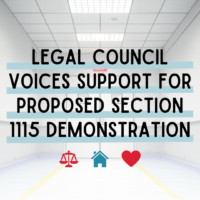Legal Council Voices Support for Proposed Section 1115 Demonstration
Illinois faces a critical dearth of behavioral and mental health services and supports available to Medicaid beneficiaries. Individuals facing homelessness disproportionately bear the burden of these deficits. According to a 2021 study conducted in the Chicago region, patients experiencing homelessness (1) experienced a higher burden of chronic conditions, (2) were less likely to receive behavioral health treatment, and (3) experienced a higher number of emergency department visits than those in stable housing [1]. Illinois needs a comprehensive, equity-focused plan to address these shortfalls now. Fortunately, the Illinois Department of Healthcare and Family Services (HFS) has announced its submission of an updated Section 1115 Behavioral Health Transformation Demonstration Waiver with the goal of mitigating these barriers by transitioning from a reliance on institutional care to community-based care.
Legal Council provides free legal services to hundreds of clients experiencing homelessness, often with co-occurring mental health and substance use disorders, each year. We are keenly aware of the unique issues these clients face in accessing health coverage and care and commend the Department’s exhaustive efforts to address long-known problems facing people with behavioral and mental health issues with evidence-based and humane solutions.
This Behavioral Health Services transformation demonstration will be authorized under Section 1115 of the Social Security Act [2]. Waivers under this act—often called “1115 waivers”—are contracts between federal and state governments that waive certain federal Medicaid requirements in exchange for states piloting new and innovative programs within Medicaid. Illinois’ recent 1115 Waiver submission builds upon the Department’s original waiver from 2018, which piloted several programs intended to cover treatment for addiction to opioids and other substances, by adding coverage for services to address social drivers of substance use with the goal of addressing structural inequities, such as food and housing insecurity.
At Legal Council, we recognize that health and well-being are composed of much more than just direct medical care and genetics. Social drivers of health—economic stability, access to quality education, social and community context, neighborhood and built environment, and access to quality healthcare—act as significant barriers to achieving good health outcomes [3]. We are thrilled to see the proposal of an extension of the original demonstration that focuses even more creatively on the root causes of health disparities, and we are especially excited about those components that focus on medical respite, justice-involved and community reintegration, non-emergency transportation, housing, and food and nutrition support.
With support from the Georgetown University Health Policy Institute’s Center for Children and Families, Legal Council has submitted comments to the U.S. Department of Health and Human Services in support of this Waiver. Click here to read the submitted comments.
Legal Council believes that Illinois’ 1115 Demonstration proposal will support the goals of the Medicaid program by improving coverage for those enrolled in the program and advancing equity for Black and Brown Illinoisans. The Demonstration would not simply be a policy change, but also represents an opportunity to create more inclusive healthcare systems that can appropriately address these critical issues and better support unhoused individuals. We will continue to leverage our expertise, as well as the stated needs of our clients and community members, to speak out in support of smart solutions like those proposed by HFS.
–
[1] Trick, W.E., Rachman, F., Hinami, K. et al. Variability in comorbidities and health services use across homeless typologies: multicenter data linkage between healthcare and homeless systems. BMC Public Health 21, 917 (2021). https://doi.org/10.1186/s12889-021-10958-8
[2] 42 U.S.C. § 1315. (https://www.ssa.gov/OP_Home/ssact/title11/1115.htm)
[3] E.H. Bradley and others, American health care paradox—high spending on health care and poor health, QJM: An International Journal of Medicine, Volume 110, Issue 2, February 2017, Pages 61–65, https://doi.org/10.1093/qjmed/hcw187


